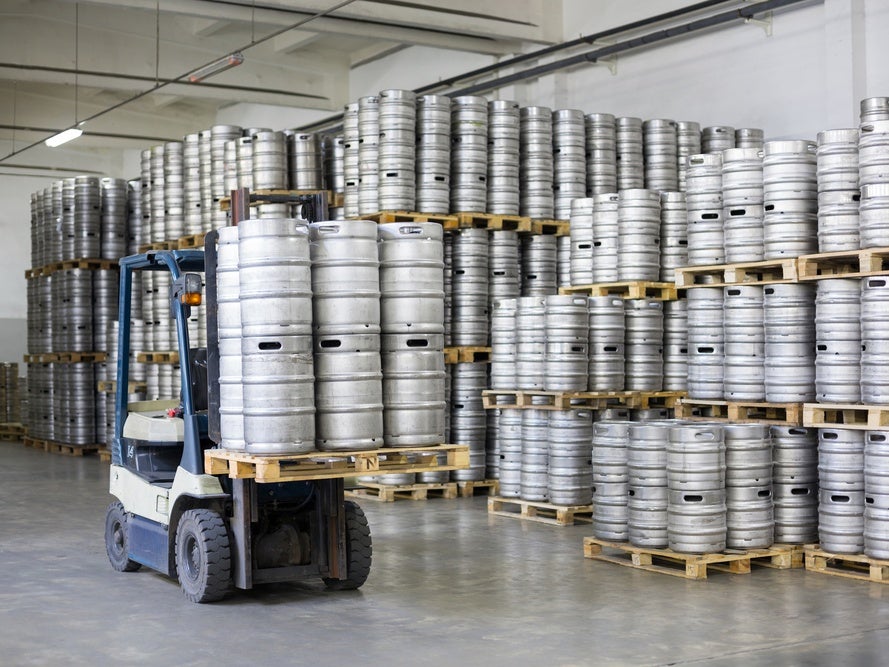
Small- and medium-sized UK beverage manufacturers are holding more than double the amount of stock compared to before the pandemic, research shows.
On average, UK beverage SMEs have 115% more stock in the face of supply chain delays, shortages and rising inflation, according to data from Unleashed.
Antipodean beverage companies are also holding excess produce, with New Zealand’s overall stock-on-hand value up 32.3% on pre-pandemic levels and Australia up by 14.4%.
London spirits producer Doghouse Distillery said it has seen its stock levels inflate in recent months. Founder and head hydrator Braden Saunders put this down to “a combination of lack of availability and also price increases”.
He said: “We have seen a 30% increase in our glass price this year which is going up another 25% in January 2023, so holding stock reduces our exposure to the rise in a sense.”
A recent survey by the Scotch Whisky Association found distillers were facing much longer lead times for materials. All those surveyed found the lead time for packaging increased by at least 10%, with half saying it had increased by over 50% and a quarter that it had doubled.
How well do you really know your competitors?
Access the most comprehensive Company Profiles on the market, powered by GlobalData. Save hours of research. Gain competitive edge.

Thank you!
Your download email will arrive shortly
Not ready to buy yet? Download a free sample
We are confident about the unique quality of our Company Profiles. However, we want you to make the most beneficial decision for your business, so we offer a free sample that you can download by submitting the below form
By GlobalDataSpeaking to Just Drinks earlier this year Australia-based Starward Whisky said longer shipping times mean the company now needs “way more inventory prepared to meet demand”. It also sources ingredients and materials from Australia where possible to mitigate these effects.
Founder Dave Vitale said: “We have to ship inventory a lot sooner than we used to in order to arrive in-market on time and we’ve got to ship glass and packaged materials to Australia a lot sooner than we would have otherwise.
“Back in the day, we used to have one container ready to leave Melbourne, one on the water and one in-market. Now we have – ideally – one in-market, two on the water and two ready to leave. You have to forward plan and have way more inventory prepared to meet demand.”
But not all small producers are feeling the need to stockpile in order to mitigate supply chain issues.
UK brewery Bristol Beer Factory says it does not produce enough beer to have to sit on stock, and the business is trading well.
Managing director Sam Burrows said: “Supply chain issues have tended to be around lead times rather than not being able to get hold of raw materials or point of sale goods. It just means we have to be more organised and order in line with our suppliers’ lead times.”
UK wine trade body Wine GB also said stock levels are “fairly stable” across the industry.
“Supply of wine is obviously vintage dependent and quite volatile in this country. Whilst demand has risen (by 70% from 2019 to 2021), supply has fluctuated. In 2021, for the first time, sales exceeded demand. Given the supply/demand dynamics, current stock levels across the industry have remained fairly stable,” it said.
Unleashed analysed the value of stock on hand, gross margin return on inventory, fulfilment days and the price paid for goods purchased, of more than 4,500 SMEs.
Gareth Berry, Unleashed CEO, said: “What started as a supply chain crisis appears to have evolved into an inventory crisis at the individual business level.
“Yes we’ve seen shipping times and prices ease but that’s at the expense of firms who are forced to hold far more stock just to stay operational.
“It’s a tough situation for beverage manufacturers that will present real cash flow pressures. Managing those stock levels down in the coming months will be a delicate task.”



